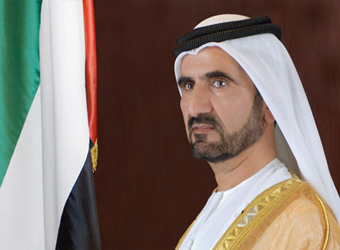His Highness Shaikh Mohammad Bin Rashid Al Maktoum, Vice- President, Prime Minister of the UAE and Ruler of Dubai, has topped the Arab world in terms of Twitter followers, according to Twiplomacy.
His Twitter handle, @HHShkMohd, is followed by more than 8.43 million people who use the micro-blogging site, making him the only Arab leader among the world’s top 10 on the Twitter scoreboard, @Twiplomacy announced on October 4.
@Twiplomacy, based in Geneva, follows the use of Twitter by governments and international organisations.
Shaikh Mohammad comes close on the heels of Indonesian President Joko Widodo, with 8.575 million followers. Twitter has been massively successful as a communication tool. Many state agencies have increasingly used the microblogging site to communicate to the people, the media and the global community.
This global embrace of online platforms has brought with it a wave of openness and transparency that has never been experienced before, said Twiplomacy. In the UAE, major policy announcements and programmes, including a government restructuring that saw the creation of the UAE’s Ministry of Happiness and the Ministry of Tolerance, for example — were announced on Twitter.
In the UAE, major policy announcements and programmes, including a government restructuring that saw the creation of the UAE’s Ministry of Happiness and the Ministry of Tolerance, for example — were announced on Twitter.
Twiplomacy wrote in a recent note: “There is a growing digital divide between governments that are active on social media with dedicated teams and those that see digital engagement as an afterthought and so devote few resources to it.
“There is still a small number of government leaders who refuse to embrace the new digital world and, for these few, their community managers struggle to bring their organizations into the digital century.”
With 39.7 million followers, US President @realDonaldTrump has now overtaken Pope Francis @Pontifex, with 39.52 million followers, Twiplomacy reported.
Shaikh Mohammad joined Twitter in June 2009, with his handle (@HHShkMohd). He has sent out 4,924 tweets since then.
Shaikh Mohammad has used Twitter to announce major government decisions such as the landmark restructuring of the federal government in February 2016, and new policies such as mandatory military service in the UAE, among others.
“The significance of these [social media] channels lies in their ability to reach out easily to all members of society through personal devices,” Shaikh Mohammad said at the Social Media Influencer Summit in 2015.
Twiplomacy last year described Shaikh Mohammad’s tweets as engaging and have made him “approachable to the masses and his open engagement with audiences on all social platforms demonstrates the UAE government’s efforts to be open to dialogue”.
Shaikh Mohammad has transformed the traditional majlis (Arabic for ‘council’) into a technology-based citizen engagement platform during the UAE Brainstorming Session last year. Using the platform, thousands of followers proposed more than 82,000 new ideas and innovative solutions in public health and education sectors.
In March 2016, as Twitter marked its 10th year, Shaikh Mohammad sent out his compliments to the micro-blogging site.
“Ideas of communication have changed & the rules have been rewritten, benefiting us all,” tweeted Shaikh Mohammad as Twitter, an online social networking service that enables users to send and read short 140-character messages, turned ten on Monday (21/03/2016).
On March 21, 2006, Twitter’s co-founder and CEO of Twitter Jack Dorsey sent a message which kickstarted Twitter: It may not be as big as Facebook, but there isn’t a shadow of a doubt Twitter has changed the lives of many in the 10 years it’s been running.
Twitter diplomacy, also “Twiplomacy” or “hashtag diplomacy”, is the use of social network and microblogging website, Twitter, by heads of state, leaders of intergovernmental organizations (IGOs), and their diplomats to conduct diplomatic outreach, engage with the public, disperse information and even leverage global influence.
source: Zawya


